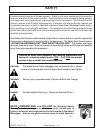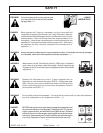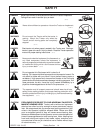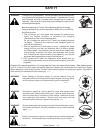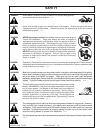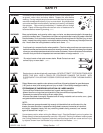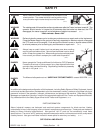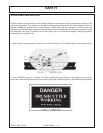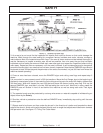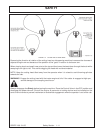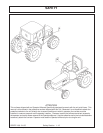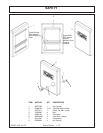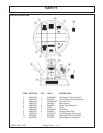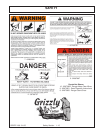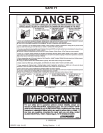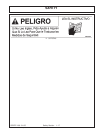
Safety Section 1-10
SAFETY
© 2005 Alamo Group Inc.
GRIZZLY 66 01/05
3. An area to be cut must first be inspected for objects that could be thrown or that could damage the
machine. Walk through the area looking for overgrown fences, boulders and rocks, culverts, stumps or
metal objects. Mark the inspected area with flags. If the area is dense and cannot be walked thoroughly it
may be necessary to inspect a smaller area as well as possible, then trim away the part that has been
inspected and can safely be removed. Walk each new area again and repeat the inspection before cutting
more away. Repeat as often as necessary until the area is cleared. It can be damaging and/or dangerous
to work the brushcutter in an area that has not been visually inspected. Note that the DANGER signs should
be placed at least 300 feet beyond the perimeter of the area to be worked, not just 300 feet from where the
machine started operating!
4. Once an area has been cleared, move the DANGER signs and cutting area flags and repeat step 3
above.
It is convenient in many cases to work in 300 foot sections. Move the first Danger sign to the beginning of
the freshly cleared area, place it, then take the first cutting area flag up to the end of the freshly cleared area
300 feet away. Walk and inspect the next 300 feet and place the second cutting area flag. Pick up the
second DANGER sign, and take it a further 300 feet along the road or trail. Note that in many cases the
DANGER area will extend in front of and behind the machine as well as along each side. Post signs
accordingly.
5. The operator's cab must be protected by a strong wire screen or materials capable of withstanding an
object thrown by the Grizzly.
6. Should a vehicle or pedestrian enter the defined DANGER area, immediately stop cutting until the area
is clear again.
7. Objects tend to be thrown out from under the shroud in the direction of rotation and towards the raised
edge of the shroud. Avoid cutting with the head titled at such an angle that objects would be thrown towards
the operator's cab. See figure 1.5 Titling The Cutter Head.



